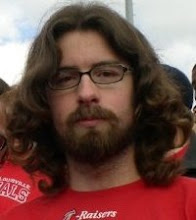[This is one of two essays about Metropolis I wrote for my class on film. It is of a different style than my others. There are spoilers.]
In Metropolis by Fritz Lang, the main character, Freder, begins a journey into the underworld of the titular city. His journey resembles the hero’s journey as depicted in Joseph Campbell’s monomyth theory. First, Freder starts out as a socially ignorant, blinded by his silver spoon, son of the ruler of Metropolis. He then has a great experience with the M-Machine, one that forever changes the way in which he perceives his world. This experience is preceded by his introduction to Maria, the only sensible female in the film, and the only one keeping the citizens from revolting. She opens his eyes to the fact that his “siblings” are the children of Metropolis. He realizes that one day he will be their ruler, and yet he knows nothing of them. His naïveté is advantageous here, where it still allows him to actually care about their experiences, something his father has long since forgotten.
This is all similar to the first stage in the hero’s journey. He voluntarily proceeds to the threshold of adventure, where he encounters the M-Machine. He survives the experience, but it forces him to act upon his vision of Moloch. His father tries to console him, but it is of no avail, as Freder has been forever changed. He now proceeds into the kingdom of the dark, replacing worker 11811. He is tested by fatigue, and relieved by the end of shift. He even receives the magical powers that many heroes receive, though his goes by a different name. He is given the power to love when he comes in contact with Maria. She also gives him, implicitly through her pontifications, the path that he should take. She assists him by showing him not only the way out of the hell-hole, but also the way to fix the hell-hole.
He also experiences a triumph similar to that of the hero, as his apotheosis raises him to the level of mediator. His existence is the most archetypal at this point as he obtains the same degree of perfection as the Messianic hero, or the Herculean hero. He is visible here in his true form, that of the pure savior of the world previously unknown to him. As he makes his return to the worker’s city in order to declare his newfound identity, he discovers that Maria has changed, and the workers are on the verge of a violent revolution.
This, too, fits into the structure of the hero’s journey. Compare it to Frodo’s return to the Shire, Jesus’ return to Jerusalem, Simba’s return to the Pride Lands, or Neo’s return to the Matrix. The situation is filled with tension, and it finally breaks when someone does introduce Freder, though not on his terms. They realize that he is the ruler’s son, and that he is only there to spy on them. He becomes the final catalyst for the revolt, and they storm past him to destroy the machines.
As they destroy the machines, Freder is trapped in the underground city as it begins to flood with the real Maria and the children of Metropolis, those previously introduced as his brothers and sisters. He escapes from the confines of sure death, saving the children and Maria, and comes full circle, having to fight off the actual villain who is behind much of the struggle of the film. Following the rooftop battle, Freder confronts his father and the workers, and with his new identity as the mediator shows them that the only way for head and hands to work together is with the heart. This heart is the symbol of the love that became his special power in defeating the evils.
2.24.2009
Subscribe to:
Post Comments (Atom)

No comments:
Post a Comment